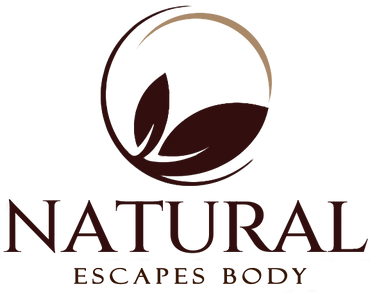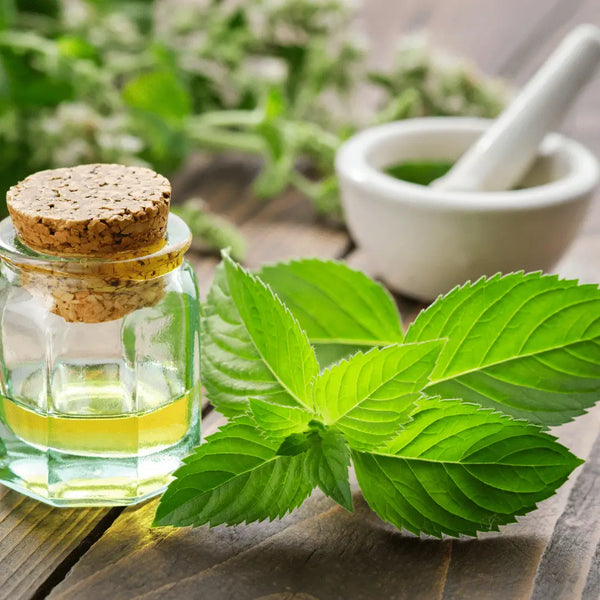The Astounding Benefits of Peppermint Essential Oil
What is Peppermint Essential Oil?
Peppermint essential oil is a highly concentrated natural oil extracted from the leaves of the peppermint plant (Mentha piperita). Known for its invigorating scent and wide array of uses, peppermint oil is a staple in aromatherapy, personal care products, and alternative medicine. This versatile oil is cherished for its cooling and refreshing properties, making it a popular choice for addressing a variety of health and wellness concerns.
Let's Get Scientific For a Minute

Peppermint essential oil is composed of numerous chemical compounds, each contributing to its unique properties and therapeutic benefits. The primary active components include:
- Menthol (40-50%)
- Provides a cooling sensation and has analgesic properties.
- Contributes to the oil's minty aroma and supports analgesic effects.
- Offers anti-inflammatory and respiratory benefits.
- Adds a sweet, minty scent and enhances the oil's soothing properties.
- Acts as an antioxidant and supports digestive health.
- Contribute to the oil's anti-inflammatory and antibacterial effects.
Benefits of Peppermint Essential Oil for the Skin
Peppermint oil offers numerous benefits for the skin, making it a valuable addition to skincare routines:
- Soothes Irritated Skin
- The cooling effect of menthol helps to calm and soothe irritated or itchy skin.
- Anti-inflammatory properties of peppermint oil can help reduce redness and swelling associated with conditions like acne or eczema.
- Antibacterial properties help to kill acne-causing bacteria and prevent breakouts.
- Peppermint oil can be mixed with a carrier oil to moisturize and hydrate dry, flaky skin.
- Balances sebum production, making it beneficial for oily and combination skin types.
- Regular use can enhance skin texture, making it smoother and more supple.
Discover our Peppermint, Rosemary & Eucalyptus Foot & Massage Cream
Benefits of Peppermint Essential Oil for the Body
Beyond its skincare benefits, peppermint oil also offers a wide range of advantages for overall health and wellness:
- Relieves Muscle and Joint Pain
- The analgesic and anti-inflammatory properties help alleviate muscle aches, joint pain, and headaches.
- Inhalation of peppermint oil can enhance alertness, focus, and energy levels, making it a popular choice for improving concentration and combating fatigue.
- Peppermint oil is known for its digestive benefits, including relief from bloating, gas, and indigestion. It can also help alleviate symptoms of irritable bowel syndrome (IBS).
- The decongestant and expectorant properties of menthol make peppermint oil effective in relieving symptoms of colds, sinusitis, and bronchitis.
- Inhalation or topical application of peppermint oil can help reduce feelings of nausea and motion sickness.
- Antimicrobial properties make it useful in treating minor wounds, infections, and athlete's foot.
Benefits of Peppermint Oil for Hair

From stimulating hair growth to improving scalp health, peppermint oil can be a valuable addition to your hair care routine.
-
Stimulates Hair Growth
- Peppermint oil can stimulate blood circulation to the scalp, which can promote hair growth. The increased blood flow ensures that more nutrients reach the hair follicles, encouraging the growth of healthier, stronger hair. Menthol, the main component of peppermint oil, dilates blood vessels, improving blood flow to the scalp and hair follicles.
-
Prevents Hair Loss
- Peppermint oil's ability to improve circulation and provide essential nutrients to hair follicles can help in preventing hair loss. Improved blood flow strengthens hair follicles, reducing hair thinning and breakage.
-
Treats Dry Scalp and Dandruff
- Peppermint oil has antiseptic and antimicrobial properties that can help treat dry scalp and dandruff. It can also balance the scalp's natural oil production, reducing dryness and flakiness. The cooling sensation of menthol soothes itching and irritation, while its antimicrobial properties target dandruff-causing fungi and bacteria.
-
Relieves Itchy Scalp
- The cooling effect of peppermint oil provides immediate relief from an itchy scalp, making it an excellent remedy for scalp discomfort. Menthol soothes inflammation and irritation, reducing the urge to scratch.
-
Balances Scalp Oil Production
- Peppermint oil can help regulate the production of sebum, the scalp's natural oil. This makes it beneficial for both oily and dry scalps. By balancing oil production, peppermint oil helps maintain a healthy scalp environment, preventing both excessive oiliness and dryness.
-
Improves Hair Shine and Thickness
- Regular use of peppermint oil can improve the overall appearance of your hair, making it shinier and thicker. Enhanced blood circulation and nutrient delivery to hair follicles result in healthier, more vibrant hair.
Discover our Peppermint & Rosemary Shampoo & Conditioner
Benefits of Peppermint Oil for Feet

-
Soothes Tired and Aching Feet
- The cooling effect of peppermint oil provides instant relief for tired, sore, and aching feet, making it perfect for a foot massage after a long day.
-
Reduces Inflammation
- Peppermint oil has anti-inflammatory properties that help reduce swelling and discomfort in the feet, making it beneficial for conditions like plantar fasciitis.
-
Fights Foot Odor
- The natural antibacterial properties of peppermint oil help eliminate odor-causing bacteria, leaving your feet smelling fresh and clean.
-
Moisturizes Dry Skin
- Peppermint oil can help moisturize and soften dry, cracked skin on the feet, promoting smooth and healthy skin.
-
Promotes Circulation
- The stimulating effects of peppermint oil enhance blood circulation in the feet, which can help alleviate pain and improve overall foot health.
-
Natural Antifungal
- Peppermint oil's antifungal properties make it an effective treatment for conditions like athlete's foot, helping to prevent and treat fungal infections.
Discover our Peppermint Foot Lotion
Exploring the Anti-Inflammatory, Antibacterial, and Anti-fungal Properties of Peppermint Oil
Peppermint essential oil is not only valued for its refreshing aroma and cooling sensation but also for its potent anti-inflammatory, antibacterial, and antifungal properties. These therapeutic benefits make it an effective natural remedy for various health issues. Let's delve deeper into each of these properties and understand how peppermint oil can be utilized for optimal health and wellness.
Anti-Inflammatory Properties
The anti-inflammatory properties of peppermint oil are primarily attributed to its high menthol content. Menthol, along with other compounds like menthone and limonene, helps modulate inflammatory responses by:
- Inhibiting Pro-Inflammatory Mediators
- Peppermint oil can suppress the production of inflammatory cytokines and enzymes such as cyclooxygenase-2 (COX-2) and nitric oxide, which play a crucial role in the inflammatory process.
- The oil can modulate the activity of immune cells, reducing excessive immune responses that lead to inflammation.
- The antioxidant properties of peppermint oil help neutralize free radicals, thereby reducing oxidative stress and associated inflammation.
Applications
- Pain Relief
- Applying diluted peppermint oil topically can help alleviate pain and inflammation associated with conditions like arthritis, muscle strains, and tendonitis.
- Peppermint oil can reduce inflammation and redness in skin conditions such as eczema, psoriasis, and dermatitis.
- Inhalation of peppermint oil can reduce inflammation in the respiratory tract, providing relief from sinusitis, bronchitis, and other inflammatory respiratory conditions.
Antibacterial Properties
Peppermint oil exhibits strong antibacterial properties due to its ability to:
- Disrupt Bacterial Membranes
- Compounds like menthol and menthone disrupt the lipid bilayer of bacterial cell membranes, leading to cell lysis and death.
- The oil can inhibit the growth and reproduction of bacteria by interfering with their metabolic processes.
- Peppermint oil can prevent the formation of biofilms, which are protective layers that bacteria form to shield themselves from antibiotics and the immune system.
Applications
- Skin Infections
- Topical application of diluted peppermint oil can treat minor bacterial skin infections, cuts, and wounds, preventing infection and promoting healing.
- Peppermint oil is commonly used in oral hygiene products due to its ability to kill oral bacteria, reducing plaque formation and preventing bad breath.
- Due to its antibacterial properties, peppermint oil can be used as a natural preservative in food products to inhibit the growth of foodborne pathogens.
Anti-fungal Properties
The antifungal effects of peppermint oil are mainly due to its ability to:
- Disrupt Fungal Cell Membranes
- Similar to its antibacterial action, peppermint oil disrupts the cell membranes of fungi, leading to cell death.
- The oil can prevent the germination of fungal spores, inhibiting the spread and growth of fungal infections.
- Peppermint oil interferes with the metabolic processes of fungi, reducing their ability to grow and reproduce.
Applications
- Athlete's Foot
- The antifungal properties of peppermint oil make it effective in treating athlete's foot. Applying diluted peppermint oil can reduce itching, inflammation, and fungal growth.
- Regular application of peppermint oil can help treat fungal infections of the nails, reducing discoloration and promoting healthy nail growth.
- Peppermint oil can be used to combat candida infections, particularly in the oral cavity (oral thrush) and on the skin.
How to Use Peppermint Essential Oil
Peppermint essential oil can be used in various ways, depending on the desired benefit:
- Aromatherapy
- Add a few drops to a diffuser to enjoy its invigorating aroma and mental clarity benefits.
- Dilute with a carrier oil (such as coconut or jojoba oil) and apply to the skin to relieve pain, soothe irritation, or moisturize.
- Add a few drops to a bowl of hot water, cover your head with a towel, and inhale the steam to clear nasal congestion and improve respiratory health.
- Mix with a carrier oil and use for a therapeutic massage to relieve muscle and joint pain.
- Add a few drops to your bathwater for a relaxing and rejuvenating experience.
- Using skincare products that contain therapeutic grade Peppermint Essential Oil can provide numerous skincare benefits, including soothing dry, irritated skin, reducing inflammation, mitigating aches and pains, and providing uplifting aromatherapy benefits. Check out our Peppermint, Rosemary & Eucalyptus Foot Cream!

Precautions and Considerations
While peppermint essential oil is generally safe for use, it is important to consider the following precautions:
- Dilution: Always dilute peppermint oil with a carrier oil before applying it to the skin to avoid irritation or sensitization.
- Patch Test: Perform a patch test to check for any allergic reactions before widespread use.
- Avoid Sensitive Areas: Do not apply peppermint oil near the eyes, mucous membranes, or on broken skin.
- Inhalation: Use a diffuser or add a few drops to hot water and inhale the steam for respiratory benefits.
- Topical Application: Apply the diluted oil to the affected area for pain relief, infection treatment, or skin care.
- Oral Hygiene: Add a drop to toothpaste or mouthwash to enhance oral hygiene.
- Pregnancy and Children: Consult a healthcare professional before using peppermint oil during pregnancy or on young children.
- Allergic Reactions: If you experience any allergic reactions, discontinue use immediately and seek medical advice.
Conclusion
Peppermint essential oil is a powerful and versatile natural remedy with a wide range of benefits for the skin and body. From soothing irritated skin and relieving muscle pain to boosting energy and improving digestive health, this essential oil is a must-have in any natural health and wellness toolkit. It is a powerful natural remedy with significant anti-inflammatory, antibacterial, and antifungal properties. Its ability to soothe inflammation, fight infections, and promote overall health makes it an invaluable addition to your natural medicine cabinet. By understanding its chemical composition and therapeutic properties, you can harness the full potential of peppermint oil to enhance your overall well-being.
***This statement has not been evaluated by the Food and Drug Administration. This product is not intended to diagnose, treat, cure, or prevent any disease.


